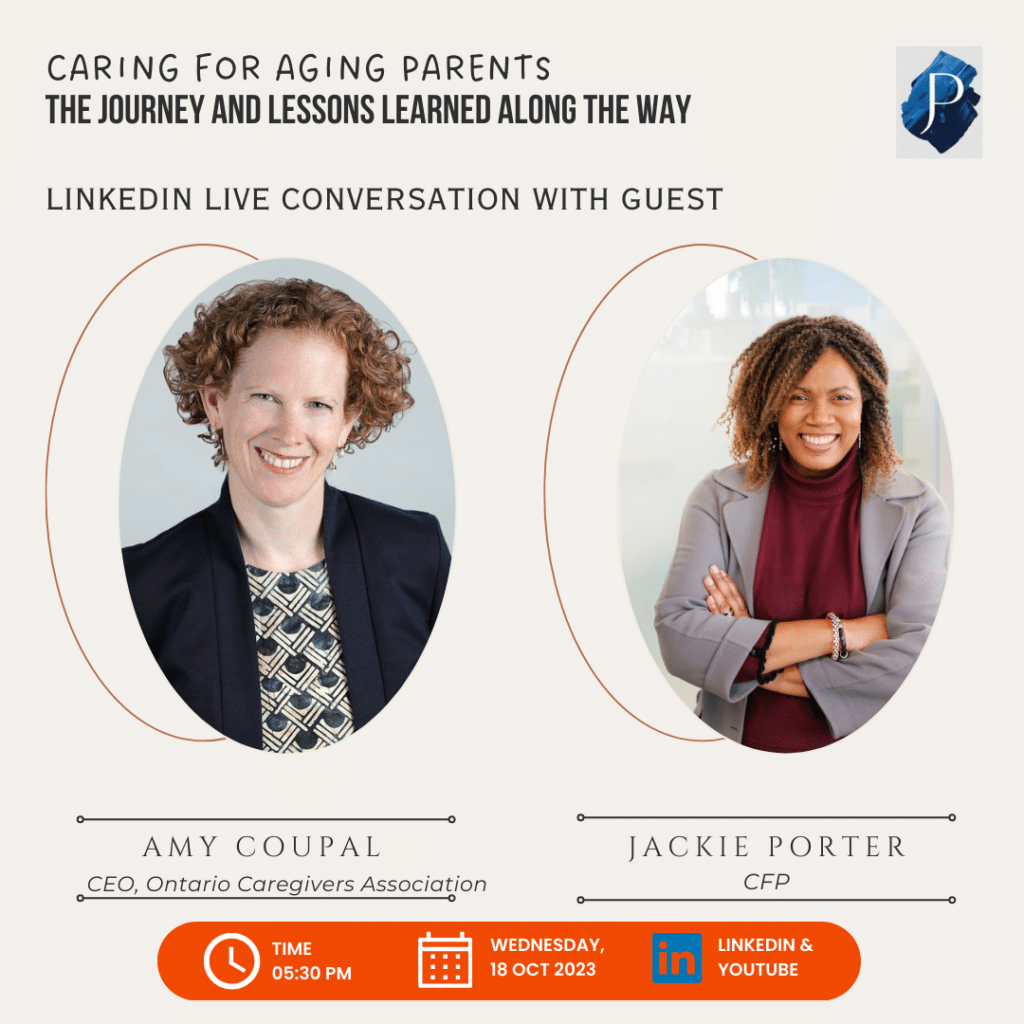Welcome to Team Jackie Porter blog! This week we had an insightful conversation with Amy Coupal, the CEO of the Ontario Caregiver Organization, where we embarked on a journey through the world of caregiving. With a rich background in the not-for-profit sector and extensive experience building organizations from the ground up, Amy is uniquely positioned to lead the charge in supporting Ontario’s 4 million caregivers. As we explore her journey and the invaluable lessons she’s gathered along the way, it’s evident that this topic is not merely her profession but a profound personal passion.
About Amy’s Caregiving Journey
Amy’s remarkable caregiving journey commenced at a tender age when she assumed the role of caregiver for her brother, who lived with cerebral palsy. This early experience laid the foundation for her future roles as a caregiver. Her caregiving responsibilities expanded to include her father, now in his mid-80s, during a significant life transition that involved moving into a retirement residence. Amy’s journey, much like many other caregivers, is characterized by the unpredictable twists and turns that life often presents.
The Unpredictability of Caregiving
Among the most formidable challenges faced by caregivers is the ever-present element of unpredictability. Regardless of how meticulously one plans, caregivers must remain vigilant and adaptable in the face of unexpected events that can readily disrupt even the most well-constructed caregiving plans. Thus, having a robust support network and a carefully cultivated circle of care becomes paramount to navigate these unforeseen challenges effectively.
Expecting the Unexpected
One of the core tenets of caregiving that Amy underlines is the importance of proactively discussing potential scenarios with aging parents. These open and honest conversations need to take place before they reach a crisis point, ensuring that everyone involved is in alignment with each other’s wishes and expectations. Since each individual’s circumstances are distinct, flexibility and adaptability are essential traits for caregivers to possess.
Initiating Difficult Conversations
Broaching conversations about caregiving can be a daunting endeavor, but it’s one that is undeniably necessary. In Amy’s case, her parents initiated these discussions, guided by the wealth of experience they had garnered from caring for her brother. Encouraging such conversations from an early stage helps to guarantee that everyone in the family is on the same page and can refer back to these earlier discussions as needed.
The Caregiver’s Evolving Role
The caregiving journey is not static; it’s marked by evolving roles that caregivers undertake as their loved ones’ needs change. These roles include:
Parent-Child: The foundational familial relationship.
Supporter: Offering assistance and emotional support.
Caregiver: Managing medication, healthcare, and daily needs.
Champion: Advocating for the well-being of their loved one and facilitating decision-making.
Substitute Decision Maker or Power of Attorney: Assuming more significant responsibilities and authority.
Understanding these transitions equips caregivers with the insights needed to prepare for the shifting dynamics and demands that caregiving entails.
Managing Finances
A critical aspect of caregiving involves the meticulous management of aging parents’ finances.
Caregivers can take several key steps:
Planning: Ensure a comprehensive financial plan is in place, considering potential contingencies. Our team can help you with a comprehensive plan, contact Jody.euloth@askjackie.ca
Documentation: Maintain clear records of where crucial financial information, accounts, and legal documents are located.
Legal Matters: Discuss wills and make certain that everyone involved comprehends their roles and responsibilities.
Financial Literacy: Assess the financial literacy of both the caregiver and the care recipient, seeking education and assistance where necessary.
Respectful Conversations: Approach financial discussions with sensitivity, understanding, and respect for the wishes and autonomy of the care recipient.
Preventing Caregiver Burnout
Amy empathizes with the significant responsibilities caregivers shoulder and acknowledges the risk of burnout. To prevent caregiver burnout and promote well-being, she recommends exploring the array of resources available:
Government Programs: Investigate relevant government programs and caregiver benefits.
Caregiver Organizations: Seek guidance and support from caregiver organizations in your province or region.
Peer Support: Connect with local peer support groups to learn from others’ experiences and share your challenges.
Financial Expertise: Consult with financial professionals who can provide tailored guidance to match your unique caregiving circumstances.
Conclusion
In a world where the role of caregiving is fraught with complexities and challenges, Amy’s insights illuminate a path for caregivers. By grasping the essence of evolving roles, proactively initiating critical conversations, and establishing comprehensive plans, caregivers can navigate this journey with compassion and confidence. The central theme in the world of caregiving is to prepare for the unknown, anticipate the unexpected, and always be a compassionate advocate for the well-being of your loved ones.
Link to full conversation on Youtube – https://www.youtube.com/watch?v=7HFPIKGc2RM





More Financial News & Events
Exploring Financial and Emotional Resilience
Mindshift Mastery and Emotional Resilience
Creating a mentor mindset: How to become one or find one
Jan
Legal Financial Fitness: A Comprehensive Checklist for Thriving Practices
Jan
How to Mentally and Financially Prepare for a Layoff
Jan
2023 tax considerations you may have missed
Dec
How to Hold on to More of Your Cash this Holiday Season
Dec
Financial Moves to Make Before Year End
Dec
Navigating Stagflation: Financial Resilience in Uncertain Times
Nov
Buying and selling real estate amidst inflation
Nov
Navigating the Changing Tides: Real Estate, Inflation, and Rising Mortgage Rates
Nov
How does inflation affect your financial plan?
Nov
Caring for aging parents: The journey and lessons learned along the way
Oct
Resources For managing care for Aging Parents
Oct
Talking to Aging Parents About Finances
Oct
Living your best life: Infusing your best life into your your everyday
Oct
Living your best life: Striking the balance between enjoying life now or enjoying it later
Sep
Living Your Best Life: Client Testimonials and Insights
Sep
Unpacking FOMO: Understanding biases, emotions and financial attitudes
Aug
How to overcome FOMO to not overspend this summer
Aug
How to Overcome FOMO on Investments
Aug
What behaviours undermine your ability to build wealth
Jul
How Do You Loose Wealth
Jul
What Does Wealth Building Mean to Our Clients?
Jul
Estate Planning: What You Can Learn From the Mistakes of Celebrities
Jun
Estate Planning For Lawyers
Jun
Estate Planning for Business Owners
Jun
Managing growth for business owners
May
Are you a lawyer with questions on how to grow your investments?
May
Cultivating a growth mindset around money
May
Why financial growth can be deceptive
May
Home and Financial Document Organization
Apr
Business owners, it’s time to start spring cleaning.
Apr
Spring Cleaning Your Finances
Apr
Unique financial challenges female lawyers face
Mar
Taking Action: A Woman’s Perspective on Deciding To Tackle Her Finances
Mar
Is there a gap in your income protection?
Mar
Knowing the difference between Tax Filer and Tax Advisor
Mar
Conquering Women’s Fears Around Finances
Mar
Trends in Family Law
Feb
PART 2: Financial Conversations Couples Need To Have at Different Life Stages
Feb
Financial Conversations Couples Need To Have at Different Life Stages
Feb
Disruption and Reinvention: Starting a Second Career in your Forties
Jan
How to create a strong financial fortress during market downturns
Jan
Creating a Financial Vision Board for 2023
Jan
5 Tips to set yourself up For Financial Success in 2023
Jan
Year-end Donation strategies
Dec
Year-end tax planning
Dec
Getting clients organized for 2023
Combating Quiet Spending
Nov